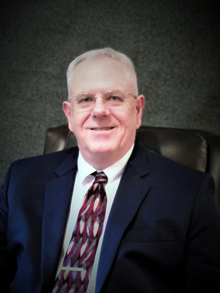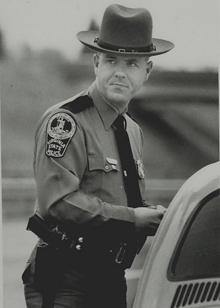
"As practitioners, we must ensure that our efforts are compatible with all aspects of homeland security and are legal and ethical, yet effective. An overarching objective is the need to balance safety and security with personal liberties and freedoms, especially as technology and information security continue to play an expanding role."
~ Dr. Jeffrey Fox, Master of Science in Homeland Security course mentor.

Fox during his days as a senior state trooper with the Virginia State Police.

Hear from Homeland Security and Emergency Management grads like Christopher Sondashi, BS '17.

Interested in advancing in the field of emergency management, planning and leadership? Our recently launched 12-credit Graduate Certificate in Emergency Management could be the ideal complement to your career experience and skills. The program was developed for practitioners and instructors and is 100 percent online.
|
|
Meet a Mentor: Jeffrey Fox, PhD
Answering the call.
Dr. Jeffrey Fox recalls precisely what he was doing on the morning of Sept. 11, 2001.
The John S. Watson School of Public Service mentor was at home working on a master's degree assignment when his wife informed him that an airplane had just crashed into the World Trade Center's North Tower.
At the time, Fox, who mentors Master of Science in Homeland Security courses at Thomas Edison State University (TESU), was a first sergeant with the Virginia State Police in charge of a busy swathe of the I-95 corridor 50 miles south of Washington, D.C. He didn't wait for the call. "I put on my uniform and went directly to work. We were instantly swamped with requests to deploy personnel to the Pentagon and secure area airports."
In the tense months that followed, homeland security began to emerge as a distinct professional discipline and academic track.
"The field didn't really exist before 9/11," noted Fox. "After the Sept. 11 attacks, there was a push to create degree programs that would better validate the field and the workforce associated with it. Higher education approached the effort in many different ways as various academic programs were rolled out and continue to evolve. Part of this progression is an increase in cybersecurity-based programs or blended programs with cyber elements. TESU has managed to incorporate these core and peripheral curriculum components in well-balanced, progressive, comprehensive degree and certificate programs."
The homeland security students Fox mentors often work in the field or in adjacent disciplines and are seeking a key credential: a master's degree to complement their workplace or field experience.
"TESU students bring a wealth of knowledge to the program," he said. "Many of them are military veterans with combat experience. Others are involved in law enforcement, emergency response or some aspect of public safety and emergency management. This means a great deal to me as an academic, and it’s an honor and privilege to work with them. Their objectives are often to advance in their current career or transition into another field more aligned with their aspirations."
The courses he mentors at TESU are International Legal and Ethical Issues (HLS-611), Domestic and Global Intelligence for Security Management (HLS-615) and Technology and Information Security (HLS-625). He also serves on the Watson School’s Curriculum Committee.
He has a decided soft spot for active-duty military and veteran students who, he said, are motivated and willing to share vast amounts of applicable real-world experience. "Over the years I have had many of our enrolled students who are also service members actively deployed in combat theaters. They go outside the 'wire,' carry out their missions and return to complete their course work at a very high level. I’m humbled by that level of commitment and, from a flexibility standpoint, often wish online courses existed back when I was serving for the U.S. Army in West Germany."
As an academic, Fox happily describes himself as, "An adjunct who teaches part time, full time." He has been teaching or mentoring online for a number of colleges and universities in the areas of criminal justice, homeland security and emergency management since 2001. Most recently, he served as program coordinator and assistant professor for Virginia Commonwealth University in Martinsville, Va., in the institution's homeland security, emergency preparedness and criminal justice programs.
In his career, Fox has served for 27 years in the field of criminal justice, 21 of those years on the Virginia State Police force. He began his law enforcement career as a military policeman in the U.S. Army and later served as a municipal police officer and sergeant, first sergeant and lieutenant for the state police. In his capacity as field lieutenant, he served as an assistant training officer managing the daily operations of the training academy. He was also appointed a statewide incident management program manager for the Virginia Department of Transportation in its Operations and Security divisions. He recently founded Fox Public Safety: Training, Educating, and Consulting, LLC, that he describes as a small company that offers face-to-face emergency management, crisis leadership training, instructional webinars and consulting services. He has published several books on the subjects of online teaching, law enforcement and public service leadership along with developing training programs for Justice Clearinghouse.
As in all professional and academic disciplines, Fox noted that a balanced and moderate mindset is key.
"As practitioners, we must ensure that our efforts are compatible with all aspects of homeland security and are legal and ethical, yet effective. An overarching objective is the need to balance safety and security with personal liberties and freedoms, especially as technology and information security continue to play an expanding role."
Fox earned an associate in applied science degree in police science from Germanna Community College in Locust Grove, Va., and his bachelor's degree in criminal psychology and sociology from Mary Washington College in Fredericksburg, Va., while patrolling the interstates as a Virginia state trooper. He continued his academic pursuits to earn a master of science degree in criminal justice administration from Virginia Commonwealth University while serving as a supervisor within various areas with the Virginia State Police. He continued his education online to earn an MBA degree with a specialization in criminal justice and his PhD in business administration with a specialization in homeland security from Northcentral University, Prescott Valley, Arizona.
When not teaching, training, writing, researching or mentoring, Fox describes his primary 'loves' as, "My faith, my family, my country, my cats, my students, the criminal justice field and history – especially military history. I live in the foothills of the Blue Ridge Mountains in Franklin County, Va., with my wonderful wife, Pam, and our spoiled cats," he noted. His daughter, who lives nearby in Roanoke, is the owner of a thriving beauty salon. His stepdaughter and grandchildren live in Texas.
Learn more about this and other programs available in the John S. Watson School of Public Service.
Insights Home »
|